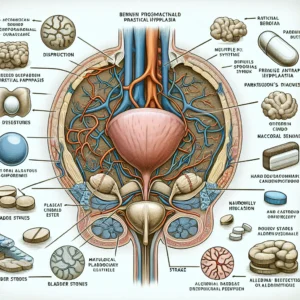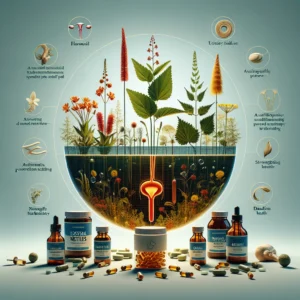Transform Your Life by Overcoming Overactive Bladder Syndrome: Effective Solutions Awaits
Dealing with the challenges of Overactive Bladder Syndrome (OAB) can shift from being a minor inconvenience to a major disruption in your daily existence. This condition can severely affect your sleep quality, diminish your self-esteem, and even create stress in your personal relationships. If you frequently find yourself rushing to the restroom during the day, waking up multiple times at night, or experiencing sudden, intense urges to urinate, know that you are not alone in this struggle. Many men face these troubling symptoms, often misinterpreting frequent urination as a normal part of aging. Fortunately, you don’t need to accept this as your reality—there are effective solutions available to help you regain control over your life and enhance your overall well-being.
Diving Deep into Overactive Bladder Syndrome: Understanding Its Complexities
Overactive Bladder Syndrome (OAB) affects millions globally, yet it remains an often overlooked health issue that deserves more attention and dialogue. OAB results from a breakdown in the communication between the bladder’s nerves and muscles, leading to frequent and urgent urges to urinate. Unlike a urinary tract infection (UTI), which is typically a temporary condition that can be treated with antibiotics, OAB is a chronic issue requiring a strategic blend of management techniques and lifestyle changes. Various factors can trigger this syndrome, such as an enlarged prostate, specific neurological disorders, and dietary habits that irritate the bladder, underscoring the necessity of understanding its causes and implications thoroughly.
Identifying the Disturbing Symptoms Associated with Overactive Bladder Syndrome
A healthy bladder typically holds urine comfortably for several hours; however, OAB disrupts this natural process, resulting in a variety of distressing symptoms that can significantly encroach upon daily life. You may find yourself making more than eight trips to the restroom each day, frequently awoken at night due to the urgent need to urinate (nocturia), or experiencing an overwhelming and sudden urge to relieve yourself. In some instances, individuals may also suffer from urge incontinence, leading to uncontrollable leakage before reaching a toilet. While these symptoms may initially seem trivial, over time they accumulate, severely impairing your work productivity, adversely affecting social interactions, and compromising your overall mental health.
 Investigating the Root Causes of Overactive Bladder Syndrome
Investigating the Root Causes of Overactive Bladder Syndrome
The bladder is a dynamic organ that relies on a precise interplay of muscle contractions and nerve signals to function effectively. Disruptions in this intricate system can lead to the development of OAB. For many men, a frequent contributor is benign prostatic hyperplasia (BPH), which creates pressure on the bladder and prevents complete emptying. Additionally, neurological conditions such as Parkinson’s disease, multiple sclerosis, and stroke can drastically affect normal bladder control. Other contributing factors include bladder stones, certain medications, and high consumption of alcohol and caffeine, highlighting the multifaceted nature of this condition.
Understanding the Daily Life Disruptions Caused by Overactive Bladder Syndrome
If your daily routine revolves around restroom availability, you are likely acutely aware of the substantial disruption OAB can create. Beyond the physical discomfort, the effects of this condition can be extensive and far-reaching. Sleep quality often deteriorates due to repeated nighttime bathroom trips, while work performance may decline as you find yourself stepping away from important meetings or tasks. Moreover, intimacy and sexual health can suffer due to feelings of embarrassment or anxiety about potential leakage. Over time, these barriers can lead to feelings of anxiety, depression, and social isolation. Thankfully, there are practical and effective solutions available that do not necessarily involve invasive procedures or medications that may have undesirable side effects.
Effective Strategies for Regaining Control Over Your Bladder Health
Successfully managing OAB requires a holistic approach that goes beyond simply limiting fluid intake or avoiding caffeine. A comprehensive strategy that focuses on bladder health, nerve function, and muscle control is crucial for achieving significant improvement. Fortunately, natural therapies, lifestyle adjustments, and alternative treatments have shown positive results in alleviating symptoms without the potential risks associated with conventional prescription medications.
Implementing a Comprehensive Holistic Approach to OAB Management
Recent research increasingly supports the effectiveness of herbal medicine, acupuncture, and targeted exercises in managing bladder dysfunction. By focusing on the underlying causes rather than merely masking symptoms, you can achieve lasting relief and empower yourself to take control of your health journey.
 Harnessing Herbal Remedies for Improved Bladder Function
Harnessing Herbal Remedies for Improved Bladder Function
Nature provides a rich array of remedies for promoting urinary health. Herbal extracts such as horsetail, nettles, and dandelion have been utilized for generations to support optimal bladder function. Horsetail serves as a natural diuretic, helping to alleviate fluid retention while strengthening bladder tissue. Nettles possess anti-inflammatory properties and contribute to prostate health, making them particularly advantageous for men dealing with OAB related to BPH. Additionally, dandelion root supports urinary tract health by eliminating toxins and assisting kidney function. When consumed in micro-encapsulated daily doses, these herbal remedies can provide consistent support without the adverse effects typically associated with synthetic medications.
Utilizing Acupuncture Techniques to Improve Bladder Control
The fundamentals of Traditional Chinese Medicine emphasize the importance of energy flow in maintaining optimal organ function. Acupuncture, which involves the insertion of fine needles into specific points on the body, has been proven to effectively regulate bladder activity. Studies suggest that acupuncture can enhance bladder control by calming overactive nerves and strengthening pelvic floor muscles. Over time, this practice can lead to reduced urges, increased bladder capacity, and improved sleep quality.
Strengthening Your Pelvic Floor for Superior Bladder Control
Weakened pelvic muscles can significantly contribute to the symptoms associated with OAB. Targeted pelvic floor exercises, often referred to as Kegel exercises, can effectively fortify these muscles, leading to enhanced bladder control. Unlike high-impact workouts that may exacerbate urinary issues, Kegel exercises are discreet, can be performed in various settings, and are highly effective. Regular practice not only helps prevent leakage but also reduces the sudden urgencies that characterize OAB.
Making Transformative Lifestyle Changes for Significant Improvements
If OAB is adversely impacting your quality of life, it’s vital to reevaluate your daily habits. Reducing your consumption of caffeine, alcohol, and artificial sweeteners can lead to substantial improvements, as these substances are known irritants to the bladder lining. While staying properly hydrated is crucial, the timing of fluid intake matters—consider hydrating earlier in the day and limiting liquid consumption in the evening to minimize nighttime restroom visits. Furthermore, managing stress is essential, as anxiety can trigger bladder spasms and worsen symptoms. Engaging in deep breathing exercises, meditation, and mindfulness practices can help calm the nervous system and improve bladder control.
 Take Charge of Your Bladder Health and Transform Your Life Starting Today
Take Charge of Your Bladder Health and Transform Your Life Starting Today
Living with OAB should not dictate the quality of your life. By implementing the right strategies, you can regain control over your bladder, boost your confidence, and enhance your overall quality of life. If you’re ready to explore natural therapies, acupuncture, and personalized guidance tailored to your unique needs, now is the ideal time to take action. There’s no reason to endure discomfort in silence when effective solutions are readily available.
Your Questions Answered: Frequently Asked Questions about OAB
What are the primary causes of overactive bladder in men?
The prevalence of overactive bladder in men is often linked to prostate enlargement, nerve dysfunction, bladder irritation, and various lifestyle factors. Certain medications and underlying health conditions can also contribute to the emergence of symptoms.
How can I distinguish between OAB and simple excessive fluid intake?
The hallmark symptoms of OAB include frequent urination, sudden urgency, and nighttime awakenings, regardless of your fluid consumption. If reducing your water intake does not alleviate these symptoms, it likely indicates an underlying bladder dysfunction rather than mere overhydration.
Are herbal treatments effective for enhancing bladder control?
Indeed, herbal remedies such as horsetail, nettles, and dandelion have been historically used to promote urinary health. When utilized in appropriate dosages and forms, these remedies can assist in reducing urgency, strengthening bladder tissue, and improving control over urinary functions.
Can acupuncture genuinely alleviate symptoms of OAB?
Clinical studies suggest that acupuncture can effectively regulate bladder activity, reduce urgency, and strengthen pelvic muscles. Numerous individuals report significant improvements in their symptoms following consistent acupuncture treatments.
Is experiencing OAB a normal aspect of aging?
While changes in bladder function may occur with age, OAB is not an inevitable part of aging. Symptoms can be effectively managed through appropriate lifestyle modifications, natural treatments, and professional support.
What lifestyle adjustments can help alleviate OAB symptoms?
Reducing your intake of caffeine, alcohol, artificial sweeteners, and spicy foods can significantly minimize bladder irritation. Strengthening pelvic muscles, managing stress levels, and ensuring proper hydration (with strategic timing of fluid intake) are also effective strategies for regulating bladder activity.
When should I seek professional assistance for OAB?
If frequent urination disrupts your sleep, interferes with daily activities, or leads to feelings of embarrassment, it’s vital to seek professional help. You do not have to suffer in silence—numerous effective solutions are available to assist you in managing your symptoms.
Presented By: Overactive Bladder Treatment
Connect with Us on Facebook
The Article: Overactive Bladder Syndrome: What You Need To Know first appeared on https://mcrtherapies.co.uk
The Article Overactive Bladder Syndrome: Essential Information You Should Know appeared first on https://mcrtherapies.com
The Article Overactive Bladder Syndrome: Key Facts You Need to Know Was Found On https://limitsofstrategy.com
